
Conservation Letters
Scope & Guideline
Shaping Effective Strategies for Global Biodiversity Preservation
Introduction
Aims and Scopes
- Biodiversity Conservation Strategies:
Research focusing on diverse strategies for conserving biodiversity, including protected areas, habitat restoration, and species management. - Human-Wildlife Interactions:
Studies examining the dynamics between human activities and wildlife, including hunting, habitat encroachment, and community-based conservation efforts. - Policy and Governance:
Analysis of conservation policies, governance frameworks, and their effectiveness in achieving biodiversity targets and addressing socio-political challenges. - Ecological Monitoring and Assessment:
Methodological advancements in monitoring biodiversity and ecosystem health, including the use of technology and citizen science. - Climate Change and Conservation:
Research addressing the impacts of climate change on biodiversity and exploring adaptive management strategies to mitigate these effects. - Cultural and Social Dimensions of Conservation:
Exploration of how cultural values, indigenous knowledge, and social equity influence conservation outcomes and stakeholder engagement.
Trending and Emerging
- Integration of Indigenous Knowledge:
A growing trend towards incorporating indigenous perspectives and traditional ecological knowledge into conservation strategies, recognizing their value in sustainable management. - Citizen Science and Community Engagement:
Increased focus on citizen science as a tool for data collection and community involvement in conservation efforts, enhancing public awareness and participation. - Interdisciplinary Approaches to Conservation:
Emerging research that bridges disciplines such as economics, social sciences, and conservation biology, highlighting the complexity of conservation challenges. - Impact of Climate Change on Conservation:
Rising emphasis on understanding how climate change affects biodiversity and ecosystems, driving the need for adaptive management practices. - Equity and Justice in Conservation:
A significant increase in discussions around equity, social justice, and the ethical implications of conservation actions, reflecting a broader movement towards inclusive practices.
Declining or Waning
- Invasive Species Management:
While still relevant, the focus on invasive species management has decreased, possibly due to shifting attention towards broader ecological interactions and conservation strategies. - Single-Species Conservation:
Research centered solely on single-species conservation has become less common as the field increasingly recognizes the importance of ecosystem-level approaches. - Traditional Conservation Models:
There is a noticeable decline in publications advocating for conventional conservation models, with an increasing preference for innovative and integrated approaches that consider socio-ecological systems.
Similar Journals
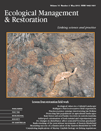
ECOLOGICAL MANAGEMENT & RESTORATION
Transforming research into impactful environmental practices.Ecological Management & Restoration is a premier international journal published by Wiley, dedicated to advancing the fields of ecology, environmental management, conservation, and restoration practices. With an impact factor that positions it in the Q2 category across various ecological and management domains, this journal serves as a critical platform for researchers and professionals seeking to address contemporary issues related to ecosystem health, biodiversity, and sustainable management. Covering a wide range of topics from ecological restoration techniques to policy impacts on nature conservation, the journal caters to a diverse audience and contributes to the scientific community's understanding of environmental challenges. Importantly, the journal provides significant visibility, ranking in the top percentiles within key ecological research arenas such as Nature and Landscape Conservation, reinforcing its value for researchers aiming to influence both scientific thought and practical applications in ecology and management. The journal's commitment to disseminating high-quality research makes it an essential resource for students, researchers, and practitioners dedicated to fostering a sustainable future.

Frontiers in Conservation Science
Fostering Collaboration for a Greener TomorrowFrontiers in Conservation Science, published by Frontiers Media SA in Switzerland, is an esteemed open-access journal dedicated to advancing research in the field of conservation science. With an E-ISSN of 2673-611X, this journal aims to facilitate the exchange of knowledge among researchers, professionals, and students by publishing high-quality, peer-reviewed articles that explore innovative solutions to contemporary conservation challenges. Since its establishment in 2020, the journal has rapidly ascended to a Q2 ranking in the Nature and Landscape Conservation category, reflecting its commitment to impactful scholarship, as evidenced by its Scopus rank of #93 out of 211 in Environmental Science and a 56th percentile ranking. By promoting open access, Frontiers in Conservation Science ensures that vital research is widely disseminated, fostering collaboration and informed decision-making in the conservation community. This journal is a crucial platform for those dedicated to understanding and preserving our planet's biodiversity and landscapes.
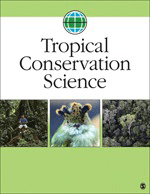
Tropical Conservation Science
Championing the science of tropical conservation.Tropical Conservation Science, an esteemed journal published by SAGE Publications Inc, plays a pivotal role in the field of environmental science, particularly within the realms of ecology and nature conservation. Established as an Open Access platform since 2008, it facilitates global dissemination of critical research findings dedicated to the preservation of tropical ecosystems. With an impressive impact factor reflected in its Q2 rankings within both ecology and nature landscape conservation categories for 2023, the journal is ranked in the 66th percentile for Environmental Science and maintains a strong position in the academic community. The journal’s scope encompasses a wide array of tropical conservation issues and aims to foster interdisciplinary collaboration among researchers, professionals, and students committed to advancing conservation strategies. Tropical Conservation Science is not merely a publication; it's a vital resource contributing to the safeguarding of our planet's biodiversity.
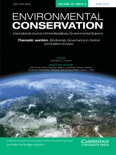
ENVIRONMENTAL CONSERVATION
Exploring Critical Issues in Conservation and PolicyENVIRONMENTAL CONSERVATION, published by Cambridge University Press, is a premier academic journal dedicated to advancing the field of environmental science and conservation. Since its inception in 1974, this journal has established a robust reputation, currently holding prestigious rankings in various categories including Q1 in Nature and Landscape Conservation and Q1 in Water Science and Technology, alongside notable Q2 rankings across several related fields. With its broad scope, ENVIRONMENTAL CONSERVATION covers critical topics in health, toxicology, pollution control, and environmental policy, making it an essential resource for researchers, professionals, and students aiming to address the pressing challenges of environmental sustainability. Despite not being an open-access journal, its impactful content, demonstrated by its significant positions in Scopus rankings, enhances scholarly discourse and informs policy worldwide. As we approach its 50th anniversary, this journal remains pivotal in fostering innovative research and promoting best practices in environmental stewardship.
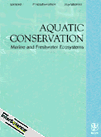
AQUATIC CONSERVATION-MARINE AND FRESHWATER ECOSYSTEMS
Connecting science and policy for aquatic conservation.AQUATIC CONSERVATION-MARINE AND FRESHWATER ECOSYSTEMS, published by WILEY, is a premier international journal dedicated to advancing the understanding of aquatic ecosystems and their conservation. With an impact factor reflecting its significant influence and a distinguished position in the Q1 quartile across key categories such as Aquatic Science, Ecology, and Nature and Landscape Conservation, this journal serves as an essential resource for researchers and professionals engaged in the study and protection of marine and freshwater environments. Covering a broad array of topics, from ecosystem management to conservation strategies, the journal encourages the dissemination of innovative research and interdisciplinary perspectives. Although it is not an open-access publication, this journal is esteemed for its rigorous peer-review process, facilitating a platform where vital research influences policy and practice in the aquatic sciences. Established in 1991, AQUATIC CONSERVATION continues to be a cornerstone in the academic exploration and safeguarding of aquatic ecosystems through to its converged years of 2024 and beyond, providing a critical lens for the future of environmental sustainability.
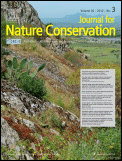
JOURNAL FOR NATURE CONSERVATION
Empowering Research for a Sustainable FutureJOURNAL FOR NATURE CONSERVATION, published by Elsevier GmbH, serves as a pivotal platform for the dissemination of applied and theoretical research in the fields of ecology, nature, and landscape conservation. With an ISSN of 1617-1381 and an E-ISSN of 1618-1093, this esteemed journal has earned a notable reputation, ranking in the Q2 category for both Ecology and Nature and Landscape Conservation in 2023. It is indexed in Scopus with commendable rankings, including #67/211 in Environmental Science - Nature and Landscape Conservation, highlighting its significance within the academic community. The journal’s diverse scope captures the complexities of environmental challenges and offers insights beneficial to researchers, conservationists, and policymakers dedicated to preserving biodiversity and facilitating sustainable practices. Situated in Munich, Germany, the journal has continuously contributed valuable knowledge since its inception in 1991, making it an essential resource for those committed to advancing conservation efforts on a global scale.

ANIMAL BIODIVERSITY AND CONSERVATION
Bridging research and action in animal conservation.ANIMAL BIODIVERSITY AND CONSERVATION is a distinguished open-access journal dedicated to advancing the knowledge of animal biodiversity and conservation practices. Published by the esteemed MUSEU DE CIENCIES NATURALS-ZOOLOGIA in Spain, it provides a platform for researchers and professionals in the fields of Animal Science and Nature Conservation. With its ISSN of 1578-665X and E-ISSN 2014-928X, the journal has been committed to open access publication since 2001, ensuring that valuable research is easily accessible to a global audience. As of 2023, it holds an impressive Q2 ranking in both Animal Science and Zoology and Nature and Landscape Conservation, reflecting its impact and relevance in the scholarly community. The journal covers a broad scope of topics, contributing vital insights and fostering discussions that support the conservation of biodiversity. With key Scopus rankings revealing its standing among the top journals in its field, ANIMAL BIODIVERSITY AND CONSERVATION continues to be an essential resource for researchers, conservationists, and students dedicated to understanding and preserving the rich tapestry of life on our planet.

Conservation Science and Practice
Fostering collaboration for a healthier planet.Conservation Science and Practice, published by WILEY, is a leading open access journal dedicated to advancing research and practice within the fields of ecology, environmental science, and conservation. Since its inception in 2019, this prestigious journal has quickly established itself as a vital resource for scholars and practitioners alike, holding impressive Quartile rankings in Ecology (Q1), Environmental Science (miscellaneous) (Q1), Global and Planetary Change (Q2), and Nature and Landscape Conservation (Q1) as of 2023. With a strong commitment to disseminating high-quality, peer-reviewed research, it serves as a platform for innovative solutions to the complex challenges faced in conservation today. The journal is accessible to a global audience, promoting the dissemination of critical findings that inform policy and practice in diverse settings. Researchers, professionals, and students looking to stay at the forefront of conservation science will find invaluable insights and developments within its pages. Join the conversation in shaping sustainable futures through cutting-edge research in Conservation Science and Practice.
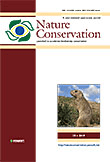
Nature Conservation-Bulgaria
Championing biodiversity through open access research.Nature Conservation-Bulgaria is a distinguished peer-reviewed journal published by PENSOFT PUBLISHERS, dedicated to advancing the field of conservation through a comprehensive exploration of ecological and environmental issues. Since its inception in 2012, this Open Access journal has cemented its position as an essential resource for researchers, professionals, and students interested in the complex dynamics of ecosystems and biodiversity conservation. With an impressive Q2 ranking in both the Ecology, Evolution, Behavior and Systematics and Nature and Landscape Conservation categories, the journal showcases significant contributions to ecological scholarship, reflecting its commitment to vibrant and impactful research. The journal's coverage extends from 2012 to 2024, and it is indexed in Scopus, where it ranks in the 63rd percentile for key areas within Agricultural and Biological Sciences. With its base in Bulgaria, the journal also aims to highlight regional conservation efforts while maintaining global relevance, making it an indispensable platform for disseminating vital knowledge and fostering collaboration across the scientific community.
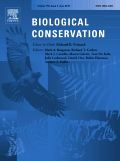
BIOLOGICAL CONSERVATION
Connecting Science and Practice for a Sustainable Future.BIOLOGICAL CONSERVATION, published by Elsevier Science Ltd, is a leading international journal dedicated to advancing the science and practice of biological conservation. Since its inception in 1968, the journal has provided a critical platform for researchers, professionals, and students in the fields of Ecology, Evolution, Behavior, and Systematics as well as Nature and Landscape Conservation. With an impressive impact factor, and ranked in the Q1 category within both ecological and conservation domains in 2023, it emphasizes high-quality empirical and theoretical research essential for understanding and addressing pressing environmental challenges. Although it follows a subscription model, the journal is known for its rigorous peer-reviewed articles that contribute significantly to the field, ensuring that the latest findings and methodologies are readily accessible to practitioners. As a vital resource for those engaged in conservation efforts globally, BIOLOGICAL CONSERVATION stands out for its commitment to enhancing knowledge and informing strategies that safeguard biodiversity across ecosystems.